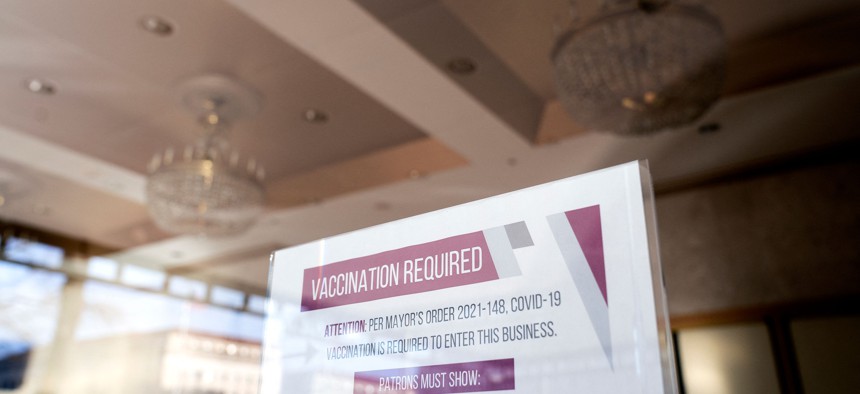Mayors Struggle With How to Push Vaccination Rates Higher

A sign requiring attendees to show proof of their Covid-19 vaccination is displayed in the doorway of the National Theatre in Washington, DC, on January 17, 2022. Photo by STEFANI REYNOLDS/AFP via Getty Images
Incentive programs remain on the table, along with requirements for showing proof of vaccine to enter indoor spaces.
Public health experts advised the nation’s mayors on Thursday to consider steps like paying people in professions at high risk of contracting Covid-19 to get vaccinated.
The advice, during a session at the U.S. Conference of Mayors’ annual winter meeting in Washington, D.C., came as mayors said they are still grappling with how to encourage more people in their cities to get the shots. About 67% of the U.S. population five years-old and up is fully vaccinated, federal data show, while nearly 80% in that age range have had at least one dose.
“Something to think about is paying people in high-risk professions” to get vaccinated, Joshua Sharfstein, vice dean for public health practice and community engagement at the Johns Hopkins Bloomberg School of Public Health, told the mayors.
Last year, states and localities began getting creative as they tried to convince residents to get the shots, offering up incentives ranging from cash jackpots, to pickup trucks, to guns. Subsequent research cast doubt on how well these types of programs worked.
Even so, as the pandemic drags on and the omicron variant has again caused cases and hospitalizations to surge, city leaders are looking at vaccine incentives as an option.
This includes buying people free drinks.
“Like a shot for a shot,” said Jake Spano, mayor of St. Louis Park, Minnesota. Spano said his city is also considering other ideas, like giving pool passes to people at community centers if they are willing to get vaccinated.
“We're pivoting toward looking at using our [American Rescue Plan Act] dollars to incentivize people,” he said at the conference.
Some cities have been paying residents to get vaccinated. Racine, Wisconsin began giving residents a $50 gift card for getting a shot in August.
Sharfstein said mayors should also consider creating vaccine requirements “for certain types of activities, particularly those that are high risk.” For instance, Washington, D.C. last week joined other cities in requiring those entering certain venues like restaurants, bars, and health clubs to show proof that they’d been vaccinated.
“That’s probably going to be more effective than a shot for a shot,” he said.
Richmond, Virginia Mayor Levar Stoney suggested city officials have entered a “new normal” with Covid-19, adding: “We know it’s not going away soon.”
And cities are particularly at risk from waves of the virus, Sharfstein noted.
“Cities are being hit first and hardest by omicron,” he said.
Places like New York, Chicago and Washington saw a rapid rise in omicron cases before the surge appeared to plateau and decline last week. “Because airplanes go from city to city, it jumps,” Sharfstein said. “So a city will suddenly find itself in the middle of it even if the rest of the state isn’t.”
Mayor Kenneth Miyagishima, of Las Cruces, New Mexico, questioned why hospitals don’t reserve intensive care units for those suffering from other serious conditions, like having had heart attacks, while having health care providers treat people offsite who refuse to get vaccinated but then catch the coronavirus.
Miyagishima stopped short of saying that he was considering pushing for such a move.
Admiral Rachel Levine, U.S. Department of Health and Human Services’ assistant secretary for health, said hospitals for ethical reasons will treat patients regardless of whether or not they choose to be vaccinated.
Danny Avula, director of the Richmond City and Henrico County Health Departments in Virginia, urged the mayors to encourage those who are particularly vulnerable to serious complications from the virus, including the elderly, to get booster shots.
A key, Avula said, is to find community leaders willing to help spread the message of why the shots are safe and effective. “Figure out in each sub demographic of who's not vaccinated who are the right influencers,” he said.
Kery Murakami is a senior reporter for Route Fifty and is based in Washington, D.C.
NEXT STORY: States must lay tech foundation for cannabis growth






